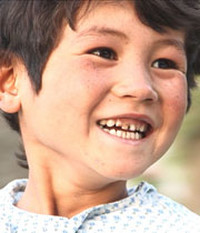Sudan: il governo e' responsabile per la pulizia etnica nel Darfur
Sudan: Government Commits ‘Ethnic Cleansing’ in Darfur
(New York, May 7, 2004) – The Sudanese government is responsible for “ethnic cleansing” and crimes against humanity in the western region of Darfur, Human Rights Watch said in a new report released today. The U.N. Security Council, scheduled today to be briefed on Darfur, should take measures to reverse this ethnic cleansing by creating conditions for the safe return of more than one million people already displaced.
Human Rights Watch called on the Security Council to strongly condemn the actions of the Sudanese government and demand that it disarm, disband and withdraw the Arab militias that engage in ethnic cleansing, frequently in conjunction with government forces. Two U.N. missions that have recently returned from Darfur will address the Security Council today on the human rights causes as well as humanitarian consequences of the conflict.
The 77-page report, “Darfur Destroyed: Ethnic Cleansing by Government and Militia Forces in Western Sudan,” documents how Sudanese government forces have overseen and directly participated in massacres, summary executions of civilians, burnings of towns and villages, and the forcible depopulation of wide swathes of land long-inhabited by the Fur, Masalit and Zaghawa ethnic groups.
“There can be no doubt about the Sudanese government’s culpability in crimes against humanity in Darfur,” said Peter Takirambudde, executive director of the Africa Division of Human Rights Watch. “The U.N. Security Council must not ignore the brutal facts.”
The Human Rights Watch report also documents how “Janjaweed” Arab militias—whose members are Muslim—have destroyed mosques, killed Muslim religious leaders and desecrated Korans belonging to their enemies.
Human Rights Watch spent 25 days in West Darfur and the vicinity, documenting abuses in rural areas that were previously populated by Masalit and Fur communities. Since August, wide swathes of their homelands, among the most fertile in the region, have been burned and depopulated. With rare exceptions, the countryside has now been emptied of its original Masalit and Fur inhabitants.
Villages have been torched not randomly, but systematically – often not once, but twice. Livestock, food stores, wells and pumps, blankets and clothing have all been looted or destroyed.
The occupation of burned and abandoned villages by uncontrolled Janjaweed has driven civilians into camps and settlements outside the larger towns. But the Human Rights Watch report documents how even in these camps, the Janjaweed kill, rape and pillage with impunity. They sometimes steal what few emergency relief items have reached the displaced populations.
For months, the Sudanese government has restricted international media access to Darfur and has limited reports about the conflict in the national press. Recently, the government has allowed minimal access to the region for international humanitarian agencies but has still failed to provide the necessary protection and assistance to displaced civilians.
“The humanitarian emergency in Darfur is immense,” said Takirambudde. “But a human rights crisis lies behind it. The Security Council must demand that the Sudanese government take immediate steps to reverse ethnic cleansing in Darfur.”
Articoli correlati

Genocidi in Africa: “Per Non Dimenticare”
Articolo realizzato in collaborazione con Raffaele Masto, scrittore, giornalista e conduttore radiofonico italiano22 giugno 2015 - Laura Tussi Dal 14 agosto è stato rapito
Dal 14 agosto è stato rapitoLiberate Francesco
Mobilitiamo l'opinione pubblica per la liberazione di Francesco Azzarà, l'operatore umanitario di Emergency rapito in Sudan. Ci sono persone che decidono di dedicarsi al prossimo in maniera totale. Francesco è uno di questi22 ottobre 2011 - Associazione PeaceLink Un film diretto da Fabrizio Lazzaretti e Paolo Santolini
Un film diretto da Fabrizio Lazzaretti e Paolo SantoliniDomani torno a casa. Grazie ad Emergency
Murtaza (un bambino afghano) e Yagoub (un ragazzo del Sudan) sono i due protagonisti del documentario21 aprile 2010 - Lidia GiannottiNewsletter n° 40 15 settembre 2009
«Un trattato non basta: non dobbiamo mai dare per scontato che gli impegni presi sulla parola e quelli firmati su un pezzo di carta siano veramente mantenuti. Costruire la pace in Sudan è un'operazione a lungo termine». Marina Peter in Scommessa Sudan, 2006
Sociale.network